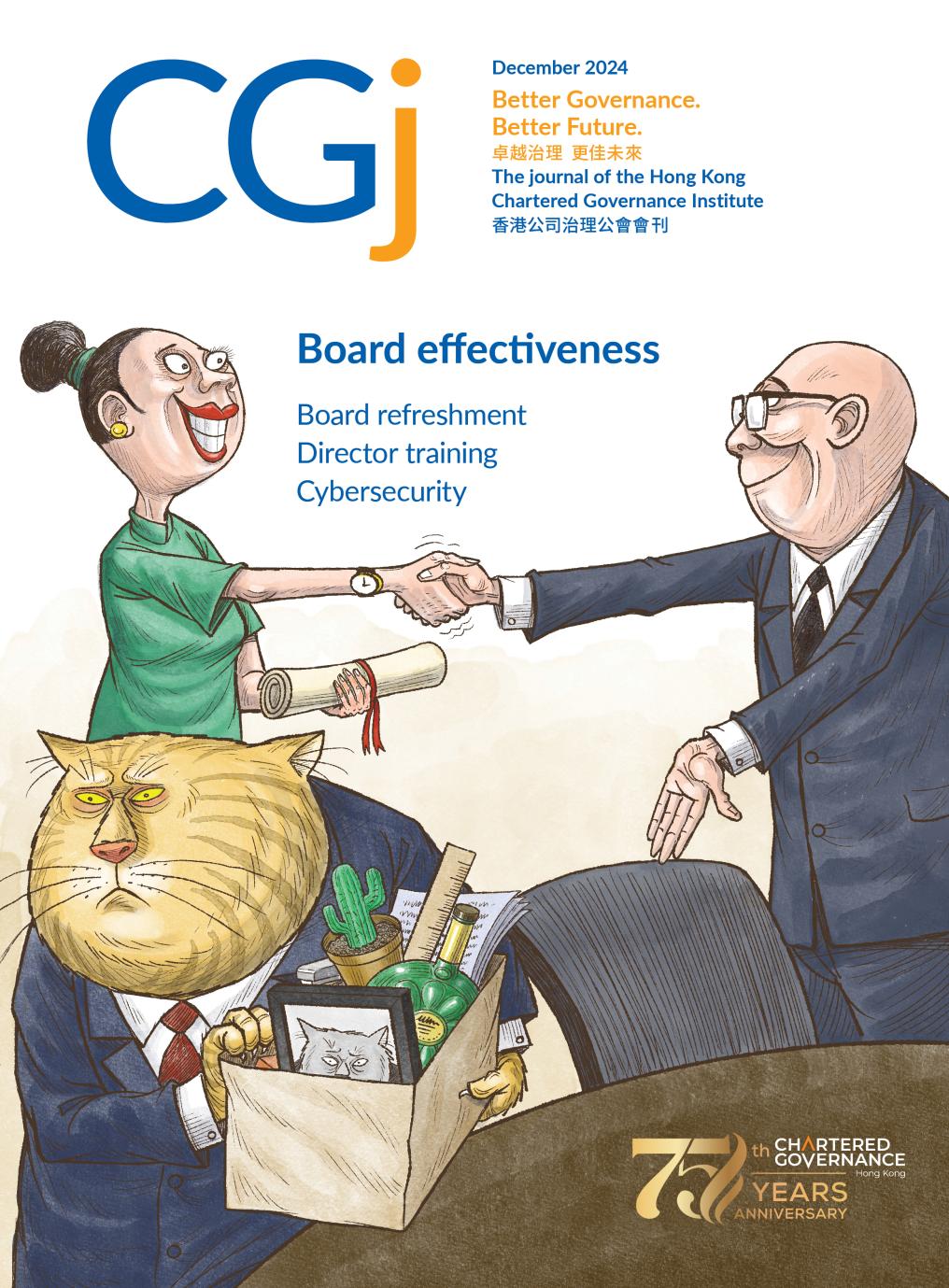
Board refreshment: a catalyst for corporate success
Robin Healy FCG HKFCG, Director – Corporate Governance Secretariat, and Kevin Leighton, Independent Corporate Governance Consultant, Link REIT, discuss the importance of board refreshment and offer practical advice for developing a board skills matrix.
Highlights
- the Exchange is emphasising board refreshment as part of its efforts to strengthen corporate governance practices in Hong Kong and to align with international best practices
- a board skills matrix is a practical tool to ensure that the board of directors has the right mix of skills, knowledge and experience to support the organisation’s long-term goals
- board refreshment strategies – including implementing effective succession planning and fostering diversity – can significantly contribute to a company’s long-term success
Introduction
The Stock Exchange of Hong Kong Limited (the Exchange) is placing greater emphasis on board refreshment as part of its broader efforts to strengthen corporate governance practices. The focus is to ensure that boards remain effective, diverse and responsive to the evolving needs of the companies they oversee.
This shift also addresses stakeholder demands for more transparent and accountable governance. The focus on board refreshment in Hong Kong mirrors global trends in corporate governance, where investors and regulators are pushing for more dynamic and diverse boards. By prioritising board refreshment, the Exchange aims to ensure that Hong Kong retains its reputation for leading corporate governance, and remains competitive and aligned with international best practices.
The importance of board refreshment
As a company revises and executes strategy, and reacts to the ever-accelerating pace of external developments, the mix of skills, knowledge and experience that served the company so well initially will need to evolve. From Kodak to MySpace, corporate history is littered with companies whose leadership failed to innovate and adapt. As Peter Drucker put it: ‘The greatest danger in times of turbulence is not the turbulence – it is to act with yesterday’s logic.’
Board refreshment is the process of renewing board members to ensure that a company has the right leadership to guide it through evolving challenges. It involves systematically planning for both the replacement and the introduction of new skill sets as directors step down from the board. This process ensures that the board remains agile, diverse and well equipped to address the company’s future.
It is more important than ever that a board regularly analyses the strengths and weaknesses of its existing directors to verify it has the right people with the right skills in the boardroom to continue driving the company towards the achievement of its strategic objectives.
Planning for change: developing a board skills matrix
It is never too early to start planning for change – when did you last update your board skills matrix?
A board skills matrix is a practical tool for beginning this change process and ensuring that the board of directors has the right mix of skills, knowledge and experience to support the organisation’s long-term goals. Developing a skills matrix also helps support compliance and serves as a proactive way to evaluate and address a board’s strengths and weaknesses. Regularly updating this matrix helps boards maintain a forward-looking approach to their composition.
In its June 2024 consultation paper, titled Review of [the] Corporate Governance Code and Related Listing Rules (2024 Consultation), the Exchange proposes the introduction of a new Code Provision (CP) requiring issuers to maintain and disclose a board skills matrix. Under the new CP, issuers would be required to disclose information on: (i) the existing skills mix of their boards, (ii) how the combination of skills, experience and diversity of their directors serves the purpose, values, strategy and desired culture of the company, and (iii) details and plans to acquire further skills.
Five areas to consider when developing your board skills matrix are:
1. the future strategic needs of the company and how these translate into board requirements
2. the specific skills, expertise and industry knowledge needed for the future board to achieve success
3. what diversity means to your organisation in terms of gender, ethnicity, age and professional background
4. the target culture for the company, and
5. the time and commitment required to meet expectations.
Gaps between the current and future skills matrix
The process of developing a board skills matrix and considering anticipated strategic developments will likely reveal a gap between the current and the future board skills set. It is important to systematically compare your current and future skills matrices to identify any gaps in skills, knowledge and expertise, and diversity.
Once the analysis has been completed, you will be in a position to develop a detailed action plan to address any identified gaps, thereby ensuring your organisation is well prepared to meet future challenges. Developing current and future skills matrices will assist your nomination committee with the formulation of the role profiles for future directors. Regular – and preferably externally conducted – board evaluations will provide invaluable information on how the board views these matters and, importantly, whether those directors ticking relevant boxes in the board skills matrix are actually delivering that expertise in the boardroom.
How to get there
As Stephen Covey, American educator and author, says: ‘A good plan begins with the end in mind.’
The director talent pool is finite and the global nature of Hong Kong’s business environment means that Hong Kong companies are competing in international markets for highcalibre candidates. The need to attract and retain top talent can be a formidable challenge and one that needs careful planning to surmount.
It is important to consider anticipated retirements from the board and how these may impact the collective skill set of not only the board, but also each of its committees as board refreshment is executed. Some boards may need to increase in size to make sure there is appropriate coverage of core skills and expertise as new skill sets are acquired.
Effective succession planning
Effective succession planning helps ensure a smooth transition of leadership and the ongoing alignment of board composition with the company’s strategic objectives.
For Hong Kong listed companies, effective succession planning involves several key components, comprising the development of formal succession plans for both executive and non-executive directors, including independent nonexecutive directors (INEDs), regular evaluations of board performance and individual directors, and the promotion of diversity.
Defining and delivering diversity
Diversity is crucial for inclusive decision-making and enhancing organisational performance. In Hong Kong, efforts to increase female representation on boards have gained momentum in recent years with amendments to the Listing Rules prohibiting single gender boards from 1 January 2025 and introducing guidelines emphasising the importance of board diversity. A comprehensive view of diversity encompasses not only gender, but also age, ethnicity, background and experience.
Any successful board refreshment process will take into account the various aspects of diversity, ensuring that the board is better equipped to navigate the complexities of the modern business landscape.
Director tenure
Long tenure, exceeding nine years, raises concerns among institutional investors about a director’s independence. To address this, in its 2024 Consultation, the Exchange proposes the introduction of a ‘hard cap’ of nine years for INEDs. It additionally proposes that, after this time, such individuals may continue to contribute to the board, but in the capacity of a non-executive director. Further, they could serve again as an INED for the same listed company, but only after a two-year ‘cooling-off period’, during which time they have not been a director of that issuer, or of any of its holding companies or subsidiaries.
Whilst the objective of these changes is to prevent entrenchment and maintain independence, a balance should be reached to secure the long-term success of the organisation. The challenge of finding the right balance may be exacerbated, given that INEDs may be required to step down contemporaneously, nine years post initial public offering. Overseas, INED tenure is often viewed as three terms of three years each, rather than a nine-year appointment, with it not being uncommon for INEDs to step down at year six.
“board refreshment is a vital component of modern corporate governance, particularly in a dynamic and competitive environment such as Hong Kong”
Conclusion
Board refreshment is a vital component of modern corporate governance, particularly in a dynamic and competitive environment such as Hong Kong. By fostering diversity, enhancing governance and promoting adaptability, board refreshment strategies can significantly contribute to a company’s long-term success.
Corporate governance standards
- The proposed changes to Hong Kong’s Corporate Governance Code (CG Code) and related Listing Rules set out in the Exchange’s 2024 Consultation – currently planned for implementation from 1 January 2025 – call for listed companies to undertake a board performance review at least every two years to ensure that the board remains independent, diverse and effective. If the proposals in the Consultation are
adopted, additional disclosures will be required in the company’s corporate governance report, including
the process for evaluating the board and the board committees, as well as information on how the results of the evaluation will be used to improve the board’s effectiveness. - Hong Kong has taken significant steps to enhance diversity, particularly in corporate governance. From
1 January 2025, single gender boards are prohibited for Hong Kong listed companies. The proposed
changes set out in the 2024 Consultation would require that companies with reporting periods starting
on or after this date disclose their board diversity policies, including measurable objectives and progress
towards their achievement. - The Exchange already mandates that at least one-third of the board of a listed company should consist
of INEDs (Listing Rule 3.10A). In an effort to further reinforce the independence of boards, the 2024 Consultation proposes a tightening of rules around director tenure. If implemented, a new Listing Rule
will see a nine-year cap placed on INED tenure in Hong Kong from 1 January 2025, with a three-year
transition period before the requirement comes into effect on 1 January 2028. Issuers will be required to disclose the current term of appointment and tenure of each director in their corporate governance reports. - Previously a recommended best practice, the proposed changes to the CG Code would require companies to maintain and disclose a board skills matrix that outlines the collective skills, expertise and attributes of the board members, to come into effect from 1 January 2025. The matrix will also need to set out how the combination of skills, experience and diversity of the directors serves the purpose, values, strategy and desired culture of the company, and, where skills gaps are identified in the current board composition, details and plans to address these gaps.
Robin Healy FCG HKFCG, Director – Corporate Governance Secretariat, and Kevin Leighton, Independent Corporate Governance Consultant
Link REIT
At the time of writing, HKEX had not yet released its consultation conclusions. Look out for an overview of the regulatory amendments to the CG Code and related Listing Rules in an upcoming edition of CGj.


